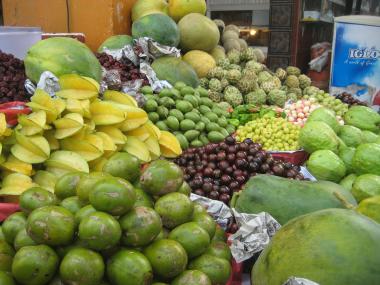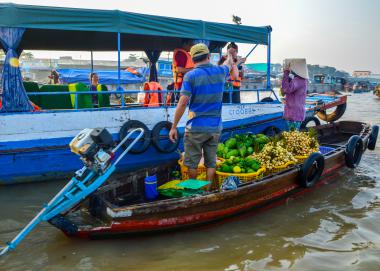Undergraduate Course Offerings
Fall
This course describes the operational fundamentals of the global food system ranging from smaller-scale subsistence or organic production to the larger-scale commercial food trade. Consumer food behavior, both local and international, represents a core analytical issue in this class. A consistent thread throughout the course is the evaluation of the role of markets to efficiently and effectively allocate food resources for individuals and societies.
View course syllabus.
Course Attribute
Gen Ed: Building Connections; and Tier 1 Individuals & Societies
The course focuses on the mathematical foundations for the primary mode of analysis conducted in agricultural and resource economics: the gain or loss in an output from an incremental change in an input. The purpose of the course is to provide students with the tools necessary to understand the theoretical models used in economics and conduct marginal analysis on these models.
View course syllabus.
Practical application of economic theory to understand and analyze issues surrounding food, resources, and the environment. Current policy debates and competing perspectives are used to illustrate the process of translating an economic problem into a researchable question.
View course syllabus.
Production and consumption theory and techniques for the analysis of agricultural and resource economics issues.
View course syllabus.
Commodity and financial futures market participants, evolution, functions, performance, price determination, and regulation with hedging and speculative applications of futures and futures-options contracts.
View course syllabus.
Essential economic concepts and analytical tools for agribusiness managers are developed and applied to current business challenges and opportunities. Emphasis placed on decision tools, budgeting, entrepreneurship, strategy, organization and relationship management.
View course syllabus.
Application and interpretation of statistical measures to problems in economics.
View course syllabus.
This course familiarizes students with the food economy and its efficiencies while identifying where gaps occur as food flows from producers to consumers. These gaps frequently lead to food insecurity with a less healthy populous, as well as food waste, an issue in more developed societies. By examining 1) the food supply chain and markets, 2) food insecurity, 3) food loss and waste along the food supply chain and 4) food policies, students will gain insights into the economic forces that shape the food system. This course stimulates critical thinking and problem solving through economic and policy perspectives, which may lead to potential resolutions for those who struggle to afford and consume healthy, wholesome foods.
View course syllabus.
Gen Ed: Building Connections; and Tier II Individuals & Societies
Applied economic theory and method of policy analysis and public choice. Emphasis is on policies impacting agriculture and rural America-especially historical and continuing government intervention in agricultural markets.
View course syllabus.
Course Attribute
Writing Emphasis Course
Additional Resources
Economics is used to study the allocation, management, and ownership of such natural resources as air, fisheries, forests, global resources, minerals, natural areas, oil & gas, water, and wildlife. The course is comprised of theoretical models and detailed applications - including the relationship between economic development and environment, the economics of climate change, and the economics of public land management. Emphasis is placed on the causes and effects of alternative institutions governing the use of the natural environment with a focus on property rights, legal rules, regulations, and administrative agencies.
View course syllabus.
Course Attribute
Cross-Listed
Spring
This course describes the operational fundamentals of the global food system ranging from smaller-scale subsistence or organic production to the larger-scale commercial food trade. Consumer food behavior, both local and international, represents a core analytical issue in this class. A consistent thread throughout the course is the evaluation of the role of markets to efficiently and effectively allocate food resources for individuals and societies.
View course syllabus.
Course Attribute
Gen Ed: Building Connections; and Tier 1 Individuals & Societies
|
The course focuses on the mathematical foundations for the primary mode of analysis conducted in agricultural and resource economics: the gain or loss in output from an incremental change in an input. The purpose of the course is to provide students with the tools necessary to understand the theoretical models used in economics and conduct marginal analysis on these models. View course syllabus. |
This course provides students with 1) a survey of business organizations as major institutions and the role of individuals as consumers, future entrepreneurs, and employees; 2) knowledge of the formal business and market structures that makes economies work; and 3) informed opinions about socio-cultural issues based on knowledge about economic theory. It offers an overview of entrepreneurial thinking and problem solving in the context of relations among the world of commerce and life sciences.
View course syllabus.
Course Attribute
Cross Listed - Gen Ed: Tier 2 Individuals and Societies
Practical application of economic theory to understand and analyze issues surrounding food, resources, and the environment. Current policy debates and competing perspectives are used to illustrate the process of translating an economic problem into a researchable question.
View course syllabus
This is an introductory course in statistics and probability. This course deals with applied data analysis, probability concepts, and statistical inference including confidence intervals and hypothesis testing. Applications and examples will be drawn from life and social sciences.
Typical offering in Spring semesters. View course syllabus.
Approved as a Moderate strand math course for degree requirements.
Data can help us discover the facts and Excel is an effective means to explore data. In general, agricultural economics and management increasingly rely on quantitative analyses to understand the economy and make decisions. The main objective of this course is to help students develop basic skills in quantitative and statistical analysis with Excel to (1) present an agricultural issue with data, graphs, and charts; and (2) confidently interpret and use descriptive statistics encountered everyday as well as in upper-level classes.
View course syllabus.
In the United States, the average Black and Hispanic/Latino household earns about half as much as the average White household and owns only about 15-20% as much wealth. Homeownership rates for many racial minorities are also significantly lower than for Whites. Such large disparities have persisted stubbornly for the past half century, despite countless public and private-sector programs intended to narrow the gaps. This course uses economics to assess the underlying causes, as well as persistent obstacles to closing the gaps. We will discuss reasons to be concerned about persistent disparities and some historical events and institutional processes that have contributed. For programs intended to narrow racial wealth and income gaps, we'll try to determine what "success" looks like, and evaluate proposals based on how much is sacrificed to close the gap. Throughout the course, we'll utilize data from many sources, as well as published empirical research to identify solutions that have the greatest promise of closing the gaps.
Exploration and analysis of the multi-dimensionality of hunger, poverty, and economic growth, with special emphasis on the cases of lower-income nations. Both microeconomic (e.g. technology, education) and macroeconomic (e.g. foreign aid, trade) factors are examined.
View course syllabus.
This course gives students hands-on experience with research in the broad area of food and resource economics. Students practice collecting, assembling, and analyzing data for empirical work. Using real world data, students learn to answer important research questions. As a university designated CURE (Course-based Undergraduate Research Experiences) course, this course helps students build quantitative skills with authentic research experience.
Course Attribute
Writing Emphasis
Market functions, costs, price indices, seasonality, marketing margins, commodity market models, price determination and price forecasting.
View course syllabus.
Application of financial management principals and tools to challenges and opportunities facing agribusiness firms. Emphasis is placed on the acquisition, allocation, control and transfer of capital resources.
View course syllabus.
This course focuses on economic methods for designing and evaluating water, food and environmental policies. Topics include optimizing water as an input in producing food, energy, recreation, and other ecosystem services; water & environmental issues in food production; pricing and conservation incentives; managing shortage risks; and economic tools for addressing conflicts over water, food and the environment. Interactive seminar style course. Calculus proficiency is required.
View course syllabus.
Course Attribute
Cross Listed
Are You a Current Student? Connect with an Advisor.
Danielle Pilar Buhrow, undergraduate senior academic advisor and graduate program coordinator for the Department of Agricultural and Resource Economics, is here to help! Schedule an appointment in CatCloud or send an email with your questions.




